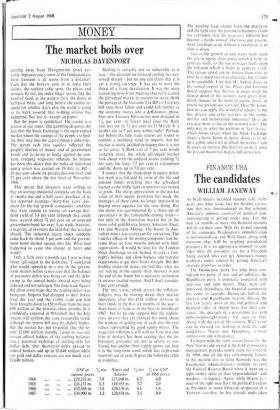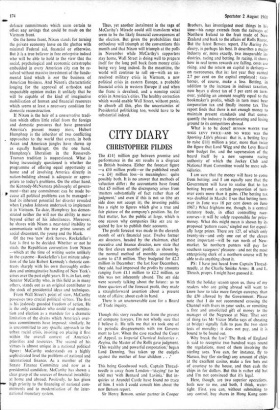The candidates
FINANCE USA WILLIAM JANEWAY
As Wall Street's heralded summer rally shifts gears into what looks like the healthy correc- tion that was foreshadowed in this column, America's summer carnival of political con- ventioneering is getting under way. For the next six months or more, the financial markets will be on their own. With the formal opening of the campaign, Washington's immobilisation is institutionalised, and Wall Street, along with everyone else, will be weighing presidential prospects. It is an appropriate moment to con- sider what the prospects arc for a President being elected who can get America's money problems under control by getting America's strategic priorities in order.
The Democratic party has long been con, sidered the party of war and of inflation: the Republican party is popularly associated with recession and tight money. Thus, with self- interested shrewdness, the financial community has come to consider Democrats bullish for markets and Republicans bearish. During the last few years, most of the old political and financial rules of thumb have lost their rele- vance: the spectacle of a peace-time war with inflation-plus-tight-money has seen to that. Along with the rest of the country, Wall Street can be excused for looking at both the 'old' candidates, Nixon and Humphrey, without enthusiasm and with dismay.
To begin with the early season favourite, the New Nixon's old record in the field of monetary management provides ample cause for concern. In 1960, one of the key contributing factors in his narrow loss to John Kennedy was the Eisenhower administration's inability to curb the Federal Reserve Board when it went on a tight money spree of then unprecedented—and needless—stringency. Again, while Nixon as a man of the right may have the political freedom as President to move leftwards in pursuit of a Vietnam ceasefire, he has already undertaken defence commitments which seem certain to offset any savings that could be made on the Vietnam front.
On the home front, Nixon stands for turning the private economy loose on the ghettos with minimal Federal aid, financial or otherwise. But it is a true believer in free enterprise indeed who will be able to hold to the view that the social, psychological and economic catastrophe embedded in every American city can be re- solved without massive investment of the funda- mental kind which is not the business of American business. And Nixon's characteristic longing for the approval of orthodox and respectable opinion makes it unlikely that he will be capable of the kind of imaginative mobilisation of human and financial resources which seems at least a necessary condition for domestic reconstruction.
If Nixon is the heir of a conservative tradi- tion which offers little relief from the foreign and domestic pressures that have generated America's present money mess, Hubert Humphrey is the inheritor • of two conflicting approaches to the world that events in both Asian and American jungles have shown up as equally bankrupt. On the one hand, Humphrey's liberalism in the Roosevelt- Truman tradition is unquestioned. What is being increasingly questioned is whether the programme of offering equal opportunity at home and of involving America directly in nation-building abroad is adequate or appro- priate to today's problems. On the other hand, the Kennedy-McNamara philosophy of govern- ment—that any commitment can be made be- cause all political problems can be managed— had its inherent potential for disaster revealed when Lyndon Johnson undertook to implement it in Vietnam. To date, Humphrey has demon- strated neither the will nor the ability to move beyond either of his inheritances. Moreover, he shares with Nixon a near-total inability to communicate with the two prime sources of social discontent, the young and the black.
Of the two 'new' dark horses, Rockefeller's fate is first to be decided. Whether or not he steals the Republican convention from Nixon —which at the time of writing seems unlikely in the extreme—Rockefeller's last minute adop- tion of the late Robert Kennedy's rhetoric con- trasts sharply with his own thoroughly ortho- dox and unimaginative handling of New York's crises over the past eight years. It is, in fact, only Senator McCarthy who, in this field as in many others, stands out as an original contributor to the stock of presidential ideas and techniques.
From Wall Street's point of view, McCarthy possesses two crucial political virtues. The first is his jealously guarded freedom of action. He is the only candidate who could read nomina- tion and election as a mandate for a dramatic limitation of the drains which America's over- seas commitments have imposed; similarly, he is uncommitted to any specific approach to the urban racial crisis, insisting on placing it first within the overall context of America's priorities and resources. The second of his virtues is almost unique in a national political figure: McCarthy understands on a highly sophisticated level the problems of national and international finance. As a member of the Senate Finance Committee and now as a presidential candidate, McCarthy has shown a clear grasp of the sources of financial instability at home and abroad. Positively. he has given saw high priority to the financing of national com- mitments and to modernisation of the inter- national monetary system. Thus, yet another instalment in the saga of McCarthy's Miracle could still transform what seem to be the likely financial consequences of the election. But given the probabilities that orthodoxy will triumph at the conventions this month and that Nixon will triumph at the polls in November while McCarthy's supporters stay home, Wall Street is doing well to prepare itself for the long pull back from money crisis being very long indeed. In the meantime, the world will continue to roll on—with an un- resolved military crisis in Vietnam, a new political crisis in eastern Europe, a probable financial crisis in western Europe if and when the franc is devalued, and a nonstop social crisis in America's cities. The healthy correction which would enable Wall Street, without panic, to absorb all this, plus the uncertainties of Presidential politicking too, would have to be substantial indeed.







































 Previous page
Previous page